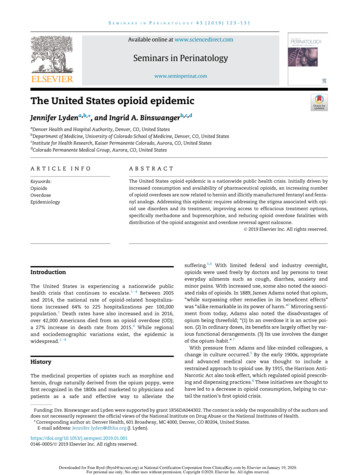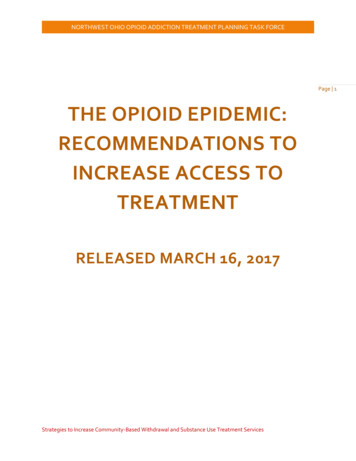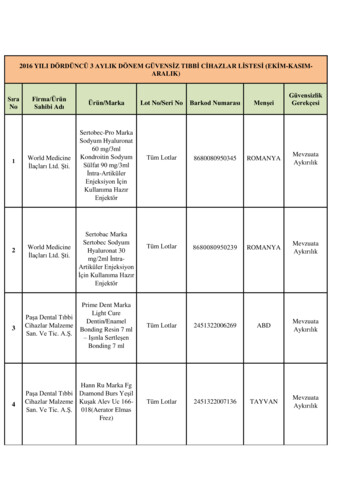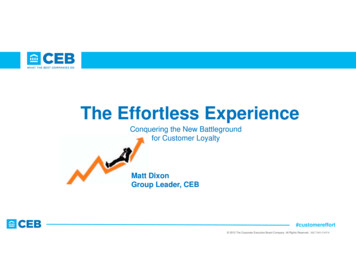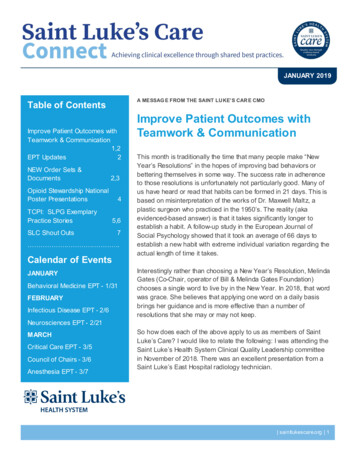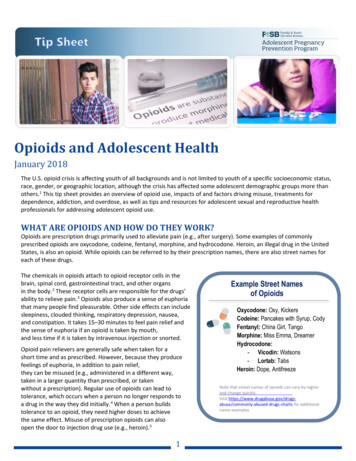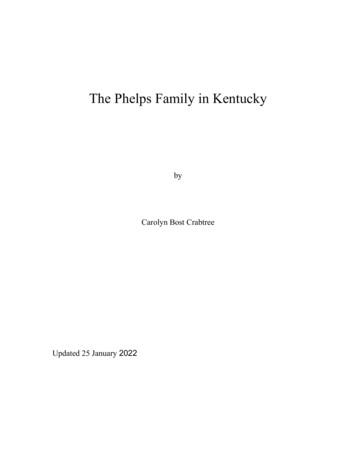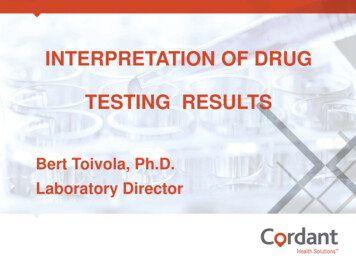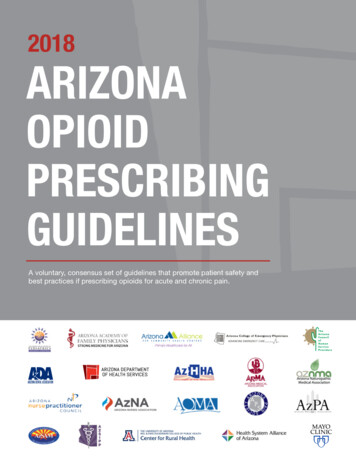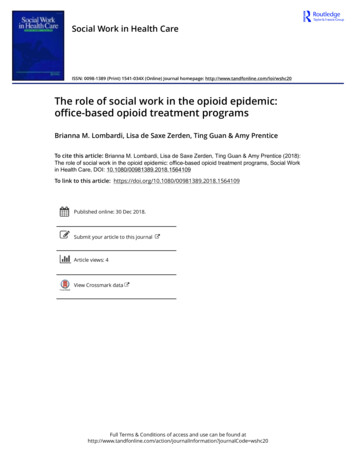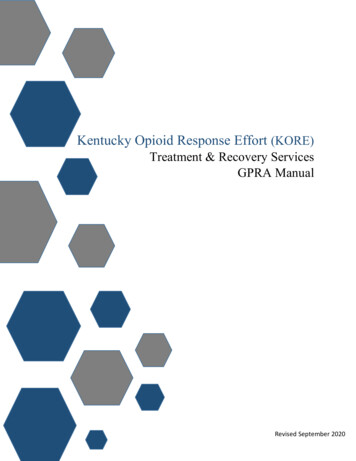
Transcription
Kentucky Opioid Response Effort (KORE)Treatment & Recovery ServicesGPRA ManualRevised September 2020
Table of ContentsWhat is KORE?. 1What is the GPRA? . 1What is the University of Kentucky’s role? . 2UK can assist with topics including: . 2What is the KORE Implementation Specialists’ Role?. 2Implementation Specialists can assist with topics including: . 2Who must be interviewed?. 2What is REDCap? . 3How do I access REDCap? . 3When will the GPRA interviews be administered? . 5What if I cannot locate a client to complete a discharge interview? . 6What if a client is discharged after completing a short period of treatment or recovery services? . 6When should a GPRA interview be entered into REDCap? . 7How do programs keep track of follow-ups and discharges? . 7How can I monitor and verify my agency’s progress? . 7A previously discharged KORE client has been readmitted for treatment or recovery services. Whatinterviews should be conducted? . 7Do we have to follow-up on each client? What is the follow-up data collection goal? . 8How are Client ID numbers issued? . 8When and how are KORE participants compensated? . 9What if a client does not want to be contacted by the University of Kentucky? . 9How can I change data for a completed interview? . 10I had to stop an interview before it was finished. Can I return to complete the interview later? . 10What if I’m doing an interview over the telephone?. 11Other key things to know:. 11Interviewing Tips: . 11Contact information:. 13References . 14
This manual is intended to assist Kentucky substance use treatment and recovery service providers incompleting GPRA interviews for eligible clients who receive KORE-funded services. In the followingpages, information on GPRA interview procedures, data entry, and guidance on special circumstances isprovided. Appendices include paper copies of the GPRA interview as well as several important forms fortracking client interview progress. Finally, contact information is provided for the state KORE teamoffering training for GPRA data collection and the University of Kentucky research team offeringtechnical assistance.In addition to this manual and its appendices, be sure to check out these additional training resourcesproduced by SAMHSA: SAMHSA Question-By-Question Instruction GuideSAMHSA Frequently Asked Questions DocumentGuide to Improving Client Participation in GPRA Follow-up InterviewsTrauma-Informed Interviewing ManualTraining videos ?What is KORE?The Commonwealth of Kentucky has been awarded the State Opioid Response grants (SOR I and SOR II)from the Substance Abuse and Mental Health Services Administration (SAMHSA). Referred to as KORE(Kentucky Opioid Response Effort), the grant seeks to increase access to FDA-approved medications foropioid use disorder (MOUD), reduce unmet treatment need, and reduce opioid overdose-related deathsby expanding access to a full continuum of high quality, evidence-based prevention, treatment, andrecovery services.What is the GPRA?The Government Performance and Results (GPRA) Core ClientOutcome Measures uses client-level interview questions from preexisting instruments (e.g., the Addiction Severity Index and theMcKinney Homeless Program reporting system) to measure andmonitor each participant’s substance use, criminal activity, mentaland physical health, family and living conditions,education/employment status and social connectedness. GPRA PurposeImprove grant effectivenessEnrich service deliveryIncrease accountabilityInform congressionaldecision makingAs part of the standard of clinical care, service providers who receive KORE funding are contractuallyrequired to collect GPRA information from all eligible clients served through the grant. For each clientreceiving treatment/recovery services, these data must be collected at three time points: (1) baseline;(2) 6-months follow-up; and (3) discharge. Again, GPRA data collection is mandated by SAMHSA and,therefore, is required of all treatment/recovery providers receiving KORE funding.The GPRA interview questions can be found in Appendix A where the baseline, 6-month follow-up, anddischarge instruments are combined, for purposes of demonstration. However, in REDCap, you areasked to select the interview time point (baseline, 6-month follow-up, or discharge) for which you willbe entering data. It has been programmed to only ask questions pertinent to each time point.1
What is the University of Kentucky’s role?The University of Kentucky has been contracted by the Kentucky Department for Behavioral Health,Developmental and Intellectual Disabilities to maintain the web-based data collection system (REDCap),organize and report GPRA data to SAMHSA, create monthly progress reports to help programs trackGPRA progress and eligibility for follow-up interviews, and help complete follow-up interviews withclients who have been discharged or otherwise lost to follow-up.UK can assist with topics including: Data entry and submission errors into RedCap Lost GPRA IDs GPRA submission confirmation Locator form updating KORE Reporting Site technical assistanceWhat is the KORE Implementation Specialists’ Role?The KORE Implementation Specialists have been assigned to help you with your KORE-funded program.They are your resource for implementation support, GPRA training, programmatic technical assistance,assistance tracking your agency’s progress, and serve as a link between you and the UK research staff.If you’re unsure of who your Implementation Specialist is, email kore.ky.gov.Implementation Specialists can assist with topics including: Trauma-informed and person-centered interviewing techniques Techniques for improving GPRA baseline and follow-up rates Techniques for improving the quality of data collected Determining which clients should receive a GPRA interview Managing GPRA data collection with multi-site projects Managing GPRA alongside other KORE reporting documentsWho must be interviewed?For programs with SOR I funding: All clients with a primary or secondary opioid use disorder who are receiving treatment orrecovery services funded through KORE should be administered the baseline, 6-month followup, and discharge GPRA interviews.For programs with SOR II funding: All clients with a primary or secondary opioid use disorder who are receiving treatment orrecovery services funded through KORE should be administered the baseline, 6-month followup, and discharge GPRA interviews.All clients with a primary or secondary stimulant use disorder (e.g., cocaine ormethamphetamine use disorder) who are receiving treatment or recovery services fundedthrough KORE should complete the baseline, 6-month follow-up, and discharge interviews.2
If you’re not sure of whether your KORE grant has SOR I or SOR II funding, ask yourImplementation Specialist.What is REDCap?When completing a GPRA interview, you will enter the client’sresponses into an online platform called Research Electronic DataCapture, or REDCap for short. REDCap is a web-based data collectionsystem that can be accessed on any device with internet access. All data are encrypted, secured, andregularly backed up. You will not need a REDCap account to complete the required GPRA interviews.How do I access REDCap?The web address for the KORE – GPRA REDCap data collection tools is: KORE – GPRA Interviews (Landing Page): https://is.gd/kore gpra interview menuBookmark this web address in your browser for quick and easy access.The KORE – GPRA Interviews link will take the interviewer to the Landing Page (see image below). Youwill first be asked if the individual you are interviewing is incarcerated or was incarcerated at the time ofthe interview. If the answer is yes, click “Yes” and do not enter the client’s information in REDCap.Contact your Implementation Specialist to learn how and when to collect the GPRA interviewwith an incarcerated client.If your client is/was not incarcerated and you select “No,” you will be presented with hyperlinks for thevarious REDCap interview tools where you will enter the client’s locator information, baseline interview,6-month follow-up interview, or discharge interview.3
4
When will the GPRA interviews be administered?A GPRA interview (Appendix B) will be completed at three time points for each client who meets criteria.1. Baseline:Conduct the GPRA interview: A standard set of measures will be initially collected attreatment/recovery service intake (i.e. baseline) using unique client identifiers and entered into REDCapwithin seven (7) days of service initiation. Providers should inform their clients their clients that theirresponses are confidential and won’t be directly linked with their name or identifying information.Collect locator information: To assist with subsequent follow-ups, client locator information will becollected during baseline interviews and entered using a separate REDCap interview tool to ensure datade-identification. It is crucial to collect as muchTrauma-Informed Interviewingclient locator information as possible at baselineThe prompt to provide a physical home addressto allow multiple contacts for each participant.may be a difficult question for some to answerInterviewers have two options for enteringdue to unstable housing. Each agency can makelocator information into REDCap. Once adecisions about how this barrier might becompleted interview is submitted, REDCap willovercome, but the most important factor isautomatically redirect to the locatorensuring that the entire data collection process beinformation page. If the interviewer cannotconducted through the lens of trauma-informedenter locator information at that moment, theycare and an awareness of the realities for manycan choose to enter the data later using thewe serve. For example, some providers have“Locator Information” hyperlink on the Landingopted to list the facility address and receive thePage (web address below). A paper copy of thefollow up correspondence and gift card for thelocator information form is found in Appendix C.GPRA Locator: https://is.gd/kore gpra locator informationBefore clicking “Submit” in REDCap, you may want to print the Locator Information page foryour records. This information may be valuable for subsequent interviews.Communicate the follow-up process:Following the Baseline and Discharge interviews, programs shouldinform clients that a similar interview will be conducted when they are discharged from the programand around 6-months after the first interview. Programs must verify that clients have received thefollow-up information sheet (see Appendix D) detailing this process, including compensation. It isessential that all clients receive this document.5
2. Six (6) months after completing a baseline interview:Conduct the GPRA interview: A similar, standard set of clientFollow-up WindowThe window for this interview is5-8 months after completion ofthe Baseline/Intake interviewmeasures will be collected 6 months after the baseline interview.Follow-up interviews should be completed no sooner than one (1)month before and no later than two (2) months after their actual due date (i.e. 6 months aftercompleting their baseline interview).Confirm the locator information: For clients no longer receiving services 6 months after completing theirbaseline interview and having been discharged (see 3. Discharge, immediately below), UK research staffmay use locator information to contact the client to complete their 6-month follow-up interview.3. Discharge:Conduct the GPRA interview: A comparable set of client measures will be collected at service discharge,which can occur at any time before or after the 6-month follow-up. As at baseline, the same uniqueidentifier and discharge data should be entered into REDCap within seven (7) days post-discharge. Eachprovider should follow their existing discharge timeline policy.For those providers without an explicit discharge policy, a discharge interview should be completed aftera period of 30 days has passed since the client received any services from that program.Confirm the locator information: If a 6-month follow-up has not yet been completed, the providershould update the locator information and enter it into REDCap. Participants indicating that updates totheir existing locator information are not needed at discharge will automatically bypass questionssoliciting new locator information.Completing discharge interviews is essential because they identify clients who havediscontinued services. UK research staff routinely monitor discharge interviews in REDCap tohelp identify clients with whom they will need to conduct 6-month follow-up interviews.What if I cannot locate a client to complete a discharge interview?If the client cannot be located when they are due for their discharge interview, a discharge should stillbe entered. In REDCap, select “A discharge interview was not conducted.” Using this option, theinterview component will be bypassed and only administrative data will be entered. Therefore, eachclient who completes a baseline interview should also have a completed discharge.What if a client is discharged after completing a short period oftreatment or recovery services?In some instances, an episode of care for a client may be very short. In this case, providers should stillcomplete the baseline interview and discharge. However, clients who are discharged less than or equalto seven (7) days from completing their baseline interview are not required to complete an interview.Instead, in REDCap, select “A discharge interview was not conducted.” Using this option, the interviewcomponent will be bypassed and only administrative data will be entered.6
If the client is discharged after receiving services eight (8) or more days after completing a baselineinterview, a full discharge interview should be completed. Follow the guidance in the immediatelypreceding section if the client cannot be reached to complete the full discharge interview.When should a GPRA interview be entered into REDCap?Whenever possible, all client data should be entered into REDCap in real time during the baseline,follow-up, or discharge interview. If paper copies of the instrument are used, interviewers should aim toenter responses into REDCap no later than seven (7) days to ensure that data are not lost orcompromised.How do programs keep track of follow-ups and discharges?Each program will be issued a KORE – GPRA Interview Tracking Form (see Appendix E). This spreadsheetwill be maintained internally by each program to track each participant’s name, date of birth, interviewcompletion dates, interview due dates, and whether each interview has been entered into REDCap. It isrecommended that this database be updated immediately after an interview has been completed. It isimportant to note that the database has been automated to populate the due date columns based oneach participant’s baseline completion date. Please ensure the accuracy of these data entered into thisdatabase.To learn about using the KORE GPRA Reports web page to aid in monitoring follow-ups anddischarges, see the next section entitled, “How can I track my agency’s progress?”How can I monitor and verify my agency’s progress?GPRA Monthly Progress Reports that show completion data for each interview time point for youragency are available at http://kore.uky.edu/kore reports/ (see Appendix H for an example report). Thisreport is intended to help providers monitor and verify their GPRA 6-month follow-up and dischargeinterview progress. The implementation specialists, KORE Project Director, and UK research staff willhave access to reports for all sites, but each provider can view reports only for their agency.Website access is password protected. Ask your Implementation Specialist for help in obtaininga username and password.All program staff who are involved with GPRA data collection are encouraged to request accessto the GPRA Monthly Progress Report website and monitor these reports closely. These reportscan be discussed at team meetings to help identify and address inconsistencies and/or barriers.A previously discharged KORE client has been readmitted for treatmentor recovery services. What interviews should be conducted?If a client is readmitted for services, programs have two options. The first option is to only complete asingle GPRA baseline interview at the initial intake, as programs are only required to administer one. Inthis case, a new baseline/intake interview would not be conducted when a client re-enters services.The second option is to administer a new GPRA baseline interview each time the client re-entersservices. In this case, the required 6-month follow-up interview would be due 6 months after the initial7
GPRA baseline, not the later ones. If option two is chosen, the same client ID number should be usedwhen entering the client’s responses in REDCap, regardless of the number of times the client presentsfor services.Do we have to follow-up on each client? What is the follow-up datacollection goal?It is expected that a 6-month follow-up interview with nearly all clients, regardless of whether or notthey complete treatment. Clients who are discharged prior to completing their follow-up interview willbe contacted by UK research staff over the telephone to complete their 6-month follow-up interviews.UK research staff rely on the most recent locator form provided by the program to complete follow-upinterviews. It is critically important that these forms are filled out as completely and accurately aspossible.The GPRA follow-up data collection goal is 80%. SAMHSA monitors this goal closely and willwithhold funding to the state if the goal is not being met.How are Client ID numbers issued?All KORE clients will be identified during the interview process by an eight-character, alpha-numericcode in order to keep their name and data separate to ensure confidentiality. The first three charactersrepresent a treatment or recovery services program code that is specific for your agency and assignedby UK. The last five characters represent each participant and will be determined by five questions atthe beginning of each interview (see Appendix F). At no time should a client’s name be included in theirinterview data.For example, a client who is receiving services from ABC Counseling (Provider ID: ABC) and was born inLexington, their father’s first name is Charles, their mother’s first name is Ellen, the first number of their8
social security number is 1, and the last number of their social security number is 9 will be assigned theClient ID ABCLCE19. In designing the ID protocol this way, each participant’s identifier should remainthe same at each GPRA interview time point.Please remember that some clients may not know their parents or may have experiencedtrauma related to their mother or father. These questions could be sensitive for someindividuals and may need to be approached in a delicate and trauma-informed way. Consultthe resources on trauma-informed interviewing from SAMHSA referenced below and/orcontact your Implementation Specialist for further assistance.When and how are KORE participants compensated?UK research staff will provide one 30.00 gift card to clients who complete their 6-month follow-upinterview. No compensation is offered for the baseline or discharge interviews.To receive compensation, participants must fill out a KORE – GPRA Interview Payment Form (seeAppendix G). Providers who complete follow-up interviews with participants are encouraged to ask theparticipant to fill out the payment form upon completion of their follow-up interview. It can take two tofour weeks for a gift card to be issued. To expedite the compensation process, providers can scan andemail a copy of the payment form to UK research staff at koreproject@uky.edu.University regulations require that a gift card cannot be dispersed without a signed payment form. If aprovider completes a follow-up interview with a client over the telephone and they are unable to obtaina signed receipt, the provider can email or call UK research staff to request they contact the participantto obtain the signed payment form.Upon receiving the completed payment form, UK research staff will mail the gift card to the addressprovided by the participant on his/her payment form. Incomplete payment forms cannot be processedand will be mailed back to the participant.Some individuals may have circumstances that affect their ability to complete payment formsand/or send and receive mail on a consistent basis. Your Implementation Specialist can helptroubleshoot problems and identify potential solutions. For example, if a client providesconsent then a gift card can be mailed to the provider rather than client address.What if a client does not want to be contacted by the University ofKentucky?While clients may still receive services from the KORE-funded programs, participation in follow-up datacollection post-discharge is voluntary and clients may choose not to complete the 6-month follow-upinterview. They may opt out when UK research staff contacts them to complete a follow-up interview.Some clients may forget that they will be contacted to complete a 6-month follow-upinterview, especially if they stop receiving services before that interview time point. It isimportant to ensure that clients understand the interview process and that they will becontacted by UK to complete a 6-month follow-up interview if they are no longer receivingservices from your agency. Please ensure that you provide the follow-up information sheet to9
clients and review it with them at intake and discharge, if at all possible. It may also help toprovide reminders about the 6-month follow-up interview periodically.How can I change data for a completed interview?Once submitted, agencies cannot access the data through the REDCap system. If modifications toexisting interview data are needed, providers should submit the KORE – GPRA Data ModificationRequest (see Appendix J) to UK research staff by emailing koreproject@uky.edu. Please provide theclient ID, time point (i.e., baseline, 6-month follow-up, or discharge) of the interview, interviewer initials,the section of the interview (i.e., Alcohol/Drugs, Medical Status, etc.) and the nature of the specificmodifications. UK research staff can make the requested data changes.Consult your implementation specialist if you have questions about the Data ModificationRequest process.I had to stop an interview before it was finished. Can I return tocomplete the interview later?To facilitate data entry, the online interview instrument is broken down into a series of smallersegments that must each be submitted before progressing onward. Once a section has been submitted,it cannot be recalled for modification. In such cases, service providers should contact UK staff to requestchanges, corrections, etc. (see above).While it is strongly recommended that each interview be completed in its entirety to ensure dataquality, if an interview is interrupted and must be completed later, the interviewer should select “Saveand Return Later” at the bottom of each data collection page. Clicking on this button will generate aunique Return Code (see below example) and web address to return to that particular interview. Pleasemake note of the Return Code and web address in order to gain access to the interview at a later time.10
What if I’m doing an interview over the telephone?If an interview is being completed by telephone, it is crucial to first confirm the identity of theparticipant using a minimum of two sources of validation such as date of birth, social security number (ifavailable), physical address, etc. Data should be entered in real time during the telephone interview oras soon as possible (but no more than seven days) afterwards.Other key things to know:UK research staff have received a federal Certificate of Confidentiality exempting disclosure ofidentifying information in any federal, state, or local legal proceedings.Interviewing Tips:Practice! We recommend that you practice these interviews with colleagues and familiarizeyourself with the REDCap interview tools before conducting your first interview. When youpractice with REDCap, enter the word “Practice” in the Full Client ID field at the bottom of the Client IDsection (i.e., first page) of the interview. This will signal to UK Research Staff that any data entered inthat interview is only for practice and can be removed from the database.Begin the interview with an explanation of why this data is being collected. Inform the client thatservices like those they are currently receiving are funded by a grant and their answers will help showhow people are being impacted. Frame the interview as an opportunity to help others, rather than aburden.11
Some interview questions touch on sensitive topics, so be sure to remind the client that they can chooseto refuse to answer sensitive questions if they are not comfortable. Introducing each section can helpprepare a client for what types of questions you are about to ask and increase the likelihood that theywill respond. For example, you can say something like this “the questions I am about to ask you arefocused on your substance use during the last 30 days.”If you observe the client is experiencing discomfort responding to questions during the interview,provide reassurance that responses are confidential and only linked by a code to maintain theiranonymity.For more on trauma-informed interviewing, see SAMHSA’s Trauma-Informed Interviewing Manual.12
Contact information:University of Kentucky KORE-GPRA UK’s Mailing Address:Center on Drug & Alcohol Research – KORE Follow UpPO Box 987University StationLexington, KY 40506-0025UK KORE Project Email Address: koreproject@uky.eduUK KORE Project Phone Number: (859) 218-2214Dr. Matthew Webster (Principal Investigator)—(859) 323-6100; email: matt.webster@uky.eduRobert Seaver (UK Project Director)—(859) 323-1997; email: robert.seaver@uky.eduSteve Cook (for questions about REDCap)—(859) 257-1942; email: sbcook2@email.uky.eduKentucky Opioid Response Effort (KORE) Team KORE Project Email Address: kore@ky.govDr. Katie Marks (KORE Project Director): katie.marks@ky.govDr. Brittney Allen (Deputy Project Director): brittney.allen@ky.govDr. Amanda Foley-Byard (Treatment Implementation Specialist): amanda.foley@ky.govMichelle Kilgore (Recovery Implementation Specialist): michelle.kilgore@ky.govShelly Steiner (Prevention Implementation Specialist): shelly.steiner@ky.govLesa Vanderpool (Re-Entry Care Administrator): lesa.vanderpool@ky.govDr. Levi Bolin (Integrated Care Implementation Specialist): levi.bolin@ky.govThank you in advance for partnering with us in this very important project. Your participation in thiseffort – along with the services you diligently provide to individual Kentuckians – will help us all to betterunderstand and respond to the ongoing opioid epidemic.13
ReferencesGovernment Performance and Results Acts (GPRA) Client Outcome Measures for Discretionary ProgramsQuestion-by-Question Instruction Guide. (2019). Retrieved PARS CSAT GPRA QxQ v11 rev.pdf.Government Performance and Results Acts (GPRA) Client Outcome Measures Frequently AskedQuestions (FAQs) for Discretionary Services Programs. (2014). Retrieved fromwww.samhsa.gov/sites/default/files/GPRA/FAQ for web users.pdf.14
Appen
automatically redirect to the locator information page. If the interviewer cannot enter locator information at that moment, they can choose to enter the data later using the "Locator Information" hyperlink on the Landing Page (web address below). A paper copy of the locator information form is found in Appendix C. GPRA Locator:
